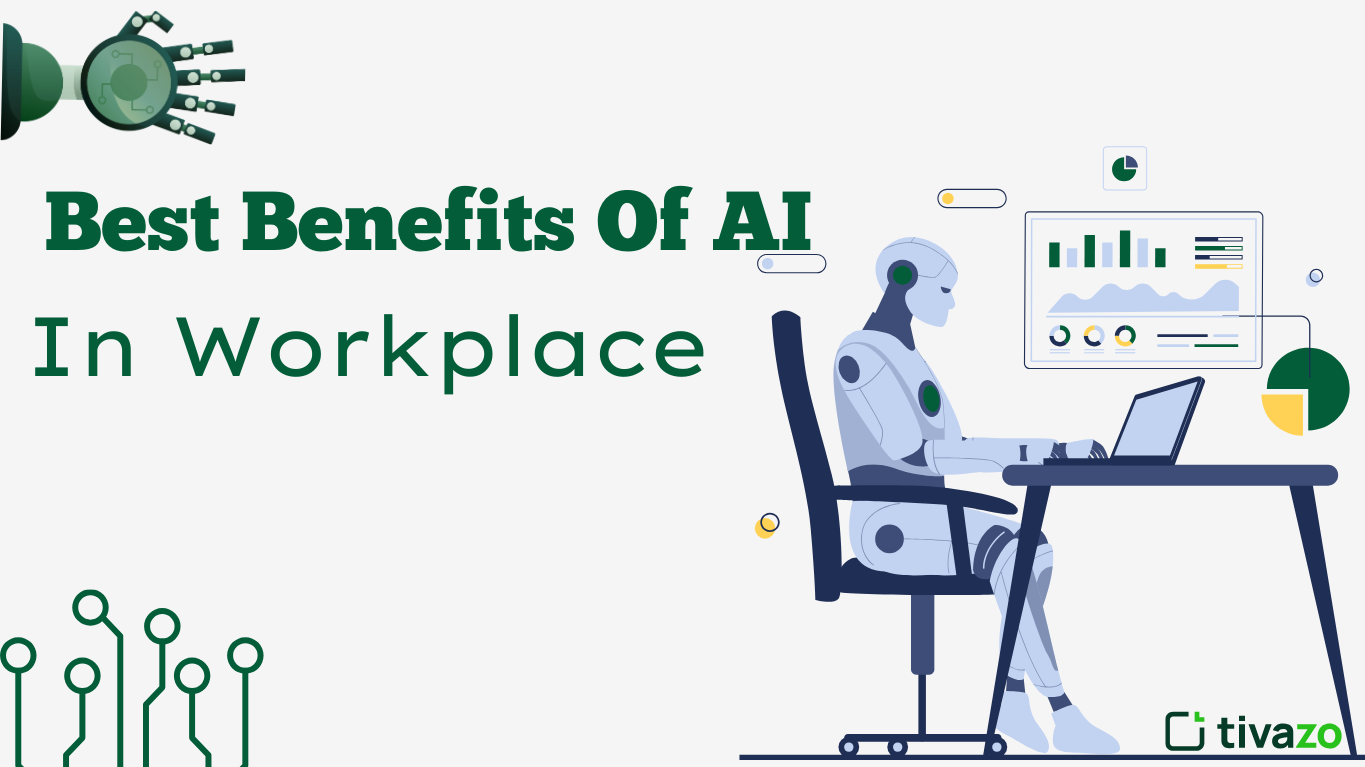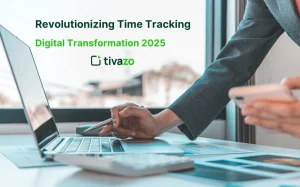Artificial Intelligence is no longer a far-off interstellar fantasy, but a near-sci-fi reality that redefines modern business and work life. The list of benefits accruing from AI in the workplace is too long and too profound to learn away from; from automating repetitive tasks to enhancing decision-making capabilities by leaps and bounds, embracing AI is fast becoming a vital strategy for organizations to scale into agility, innovation, and sustainable growth.
But what real value does AI bring to your team, and by extension, to your organization? This exhaustive write-up shall help examine how AI empowers employees, explore real-world examples across many industries, admit its possible challenges, and finally, help you lay down an easily executable roadmap for AI adoption in your organization this very minute. Understanding such benefits of AI at work is just the first step toward a future where performance and intelligence are human-centered and made more feasible.
AI at Work: The Good Stuff Nobody Talks About
Look, let’s be real, the benefits of AI get a bad rap for replacing jobs, but honestly? It’s a lifesaver when it comes to ditching all the mind-numbing busywork. You know the stuff: copy-pasting data, sorting through emails, ticking boxes all day. Yawn. With AI in the mix, people get to use their brains for once. Imagine that.
Data entry
Normally, it’s the soul-crushing kind of work that makes you question your life choices. Now? AI just chews through invoices, forms, customer feedback any boring chunk of data you throw at it. Suddenly, the folks in finance or admin can stop playing Excel-jockey and start tackling actual problems that matter. I mean, who wouldn’t want that?
Streamline scheduling
Don’t even get me started. If you’ve ever tried to coordinate a meeting between five people who all “have a hard stop at 2 PM,” you know the struggle. AI assistants just handle it—nudge people for availability, set up meetings, even tweak the schedule if someone flakes last minute. It’s like having a personal assistant who never needs coffee breaks. So yeah, less time spent wrestling with calendars, more time doing, well, literally anything else.
Bottom line: Knowing and acknowledging the benefits of AI provided to us isn’t just about robots stealing your lunch money. It’s making work a bit less soul-sucking. Wild, right?
Automated report generation
Artificial intelligence can create, format, and even summarize regular reports from various data sources, enabling employees to deal with interpretive insight and strategizing rather than tedious data gathering. Its benefits of AI are remarkable due to various reaons explained below:
Supply Chain & Inventory Management
Benefits of AI, in logistics and retail industries, include monitoring stock levels, predicting changes in demand, and automating the order of supply in ways that ensure sufficient supply without excess, minimizing the human intervention needed.
Look, when you clear out all that mind-numbing busywork—the endless repetitive stuff nobody likes doing—people finally get to sink their teeth into the good stuff. You know, stuff that needs a brain: coming up with wild ideas, solving weird problems, thinking on their feet, just being plain ol’ creative. That’s what folks want at work, right? Honestly, that’s why everyone keeps hyping the benefits of AI at the office: it’s not just about robots doing your dishes, it’s about freeing humans up to use their brains. Makes work way less soul-sucking, way more satisfying.
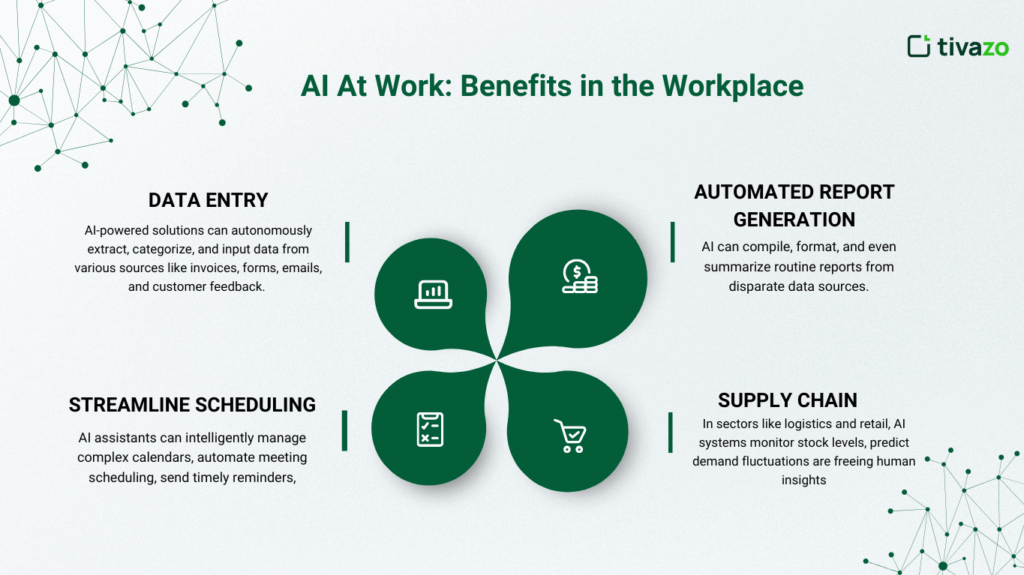
Enhanced Decision Making with Data-Driven Insights
Man, with all the notifications, emails, and random data dumps hitting you every five minutes, it’s no wonder folks are drowning in info these days. Seriously, it’s like trying to drink from a firehose. But here’s where AI pulls its weight—this thing can chew through mountains of data way faster than any of us could (unless you’re some sort of mutant spreadsheet wizard). Considering a data-driven approach that benefits from AI can come in handy. So yeah, instead of sifting through all the noise, you get the stuff that matters, right when you need it. Not bad.
Predictive analytics
AI looks at piles of old data, basically playing detective with your spreadsheets, and starts spotting patterns. Suddenly, it’s telling you stuff like, “Hey, this customer’s probably about to buy,” or, “That machine’s about to throw a tantrum.” Sales teams get a heads up on which leads are worth chasing, marketing folks can finally stop guessing which campaign is gonna flop, and your maintenance crew gets to fix stuff before it explodes. Pretty solid.
Personalized recommendation
Whether it’s pushing the right product to a customer or sending you the exact work doc you need (instead of making you go spelunking through a nightmare folder structure), AI just gets smarter about serving up the good stuff. It’s like having a digital sidekick who knows what you want before you do—sometimes creepy, mostly helpful. The benefits of AI can and have made a difference today for individuals who are tech-friendly.
Optimized Resource Allocation:
AI affords resource allocation, be it personnel, budget, or material, according to the highest level of performance, thereby delivering substantial savings and improved operational performance.
Ultimately, intelligent, fast, and self-assured decision-making processes at all organizational levels showcase the advantages emanating from the deployment of artificial intelligence in the workplace. The benefits of AI for these sectors aren’t just useful anymore rather it has become a mandatory aspect of usage on their daily lives.
Work-Life Balance
The repeated pressure to deliver more and more with fewer and fewer resources, needless to say, takes a toll on the emotional state and hence leads to burnout in employees. Benefits of AI contribute substantially to the realization of this healthy and sustainable work-life balance via optimizing workflows and increasing efficiency, a subtle yet significant aspect of the benefits of AI in the workplace.
Task Management
AI readily integrates with the existing systems to completely automate multi-step processes, offering a significant reduction in manual effort to push tasks from one stage to another; therefore, there would be fewer nights spent on administrative catch-up.
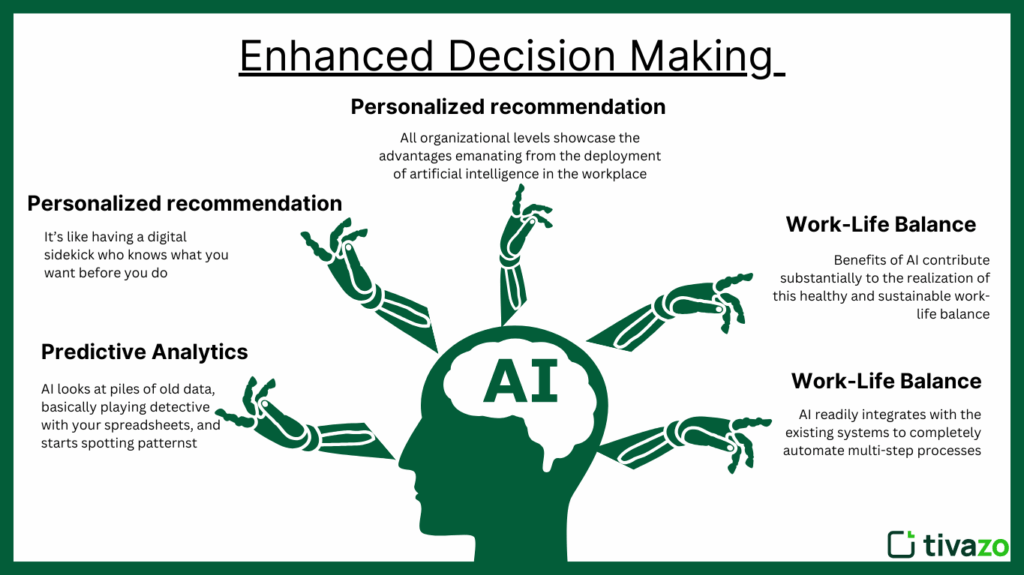
AI in the Workplace: Real-World Examples
AI has led to the next revolution in how businesses operate across critical sectors. Here are some realistic examples of the merits of Benefits of AI in actual workplace scenarios.
Customer Service
- Chatbots (e.g., Zendesk, Intercom): Perform FAQs and repetitive tasks instantaneously to free up human agents to deal with more complex issues.
- Sentiment Analysis: Detects frustrated customers via tone and language, allowing for quicker intervention.
- Smart Routing: Sends inquiries to the best-suited agent for the situation, further enhancing first-contact resolution.
Marketing
- Content Personalization (e.g., HubSpot, Jasper): Personalized content sent to the user, increasing engagement.
- Predictive Analytics: A forecast of campaign performance, facilitating better-informed decisions.
- AI Content Tools: Faster creation of blogs, ads, and posts thanks to technology like Jasper or Copy.ai.
HR and Recruitment
- Resume Screening: Spells out red flags for disengagement so that human resources can counteract early, often using tools like the best HRIS platforms to streamline these processes.
- Video Interview Analysis: Evaluates various cues in communication and fit.
- Retention Prediction: Spells out red flags for disengagement so that human resources can counteract early.
Project Management
- Smart Task Prioritization: Benefits of AI in Project management tells what to do next based on timings and workloads.
- Risk Detection: Flags issues of a project before they become acute and outburst in terms of time delays or other problems.
Finance and Accounting
- Invoice Automation: Shortens approval and matching processes with reduced error rate.
- Fraud Detection: Real-time unusual transactions spotting.
- Expense Categorization: Automatically sorts expenditure data to facilitate bookkeeping.
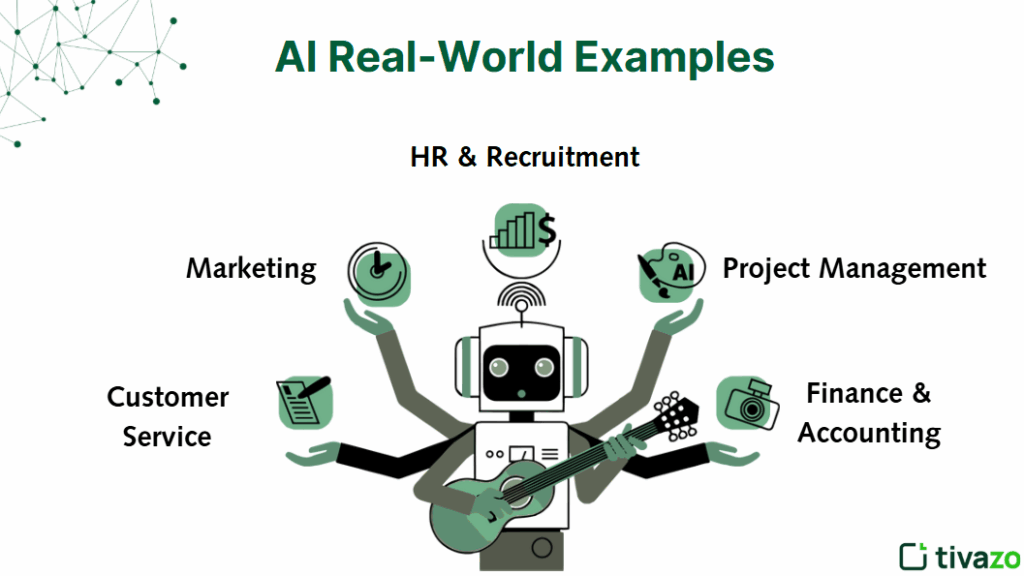
Disadvantages of AI in the Workplace
In light of the clear alternatives to the promise of benefits of AI about workplaces operating with balanced perspectives, we must also put forth an understanding of the challenges and threats that may be endemic in its application. Such issues must be engaged with proactively if an integrated AI is to be applied successfully and ethically.
Worries & Anxiety
Perhaps one of the most frequently talked about concerns is the fear that a widespread adoption of the benefits of AI could significantly displace workers, especially for roles comprising repetitive or otherwise automatable tasks.
Resistance to Change
Employees may view the benefits of AI as a threat to their jobs, making them resistant and even skeptical, while lowering their morale and unwillingness to deal with new AI-powered systems.
Continuously Upskilled Workers
Along with creating new opportunities, the benefits of AI demand considerable investments to reskill and upskill the existing workers. The whole exercise often becomes costly, time-consuming, and complicated for organizations, especially in fast-changing industries.
High Cost & Nasty Complexity
Costs a Fortune can be expensive, including setting up fancy AI tools, buying the hardware, and hiring experts. Not cheap, especially for smaller companies. Getting AI to work with your ancient legacy systems? Think digital duct tape and lots of headaches. It’s Never Ending Maintenance: AIs aren’t self-driving—they need constant updates and retraining, which means more cash and effort over time.
The “Black Box” Problem
Some AI models are a total mystery, even to their creators. If your AI spits out a bizarre answer, good luck trying to explain “why” to your boss or the regulators. Here’s the Black Box Problem in AI, put simply: even though advanced AI systems—especially deep learning models—can deliver impressive results, their decision-making process is often completely opaque. It’s like getting a solid answer from a consultant but not being able to trace how they reached that conclusion. For businesses operating in finance, healthcare, or recruitment, that’s a real headache.
Why? Well, if an benefits of AI system makes a questionable or biased call, there’s no straightforward way to audit it or explain its reasoning—forget about correcting it efficiently. That kind of uncertainty doesn’t just erode trust; it opens the door to compliance issues and legal exposure.
Data Privacy
Stack up private info in one spot and, poof, hackers pop up like mushrooms after rain.
Screw up GDPR or CCPA rules? Boom—you’re famous, but, like, not in the way you want. Enjoy your fifteen minutes on the “oops, we leaked everything” news cycle.
Let’s talk business. On the benefits of AI systems run on personal data—lots of it. That’s the price of high performance these days. But with all that data flying around, there’s a real risk: breaches, misuse, you name it. Companies can’t afford a sloppy approach here. GDPR, CCPA, those aren’t just buzzwords—they’re legal landmines. And honestly, most users are in the dark about where their data’s going or what’s being done with it.
For any business that wants to stay ahead (and out of court), it’s not enough to say “we value your privacy.” You’ve got to walk the walk. That means locking down your systems, being transparent, and getting consent before touching someone’s info. Bottom line: strong data governance isn’t just a checkbox—it’s critical for trust, compliance, and, frankly, your reputation.
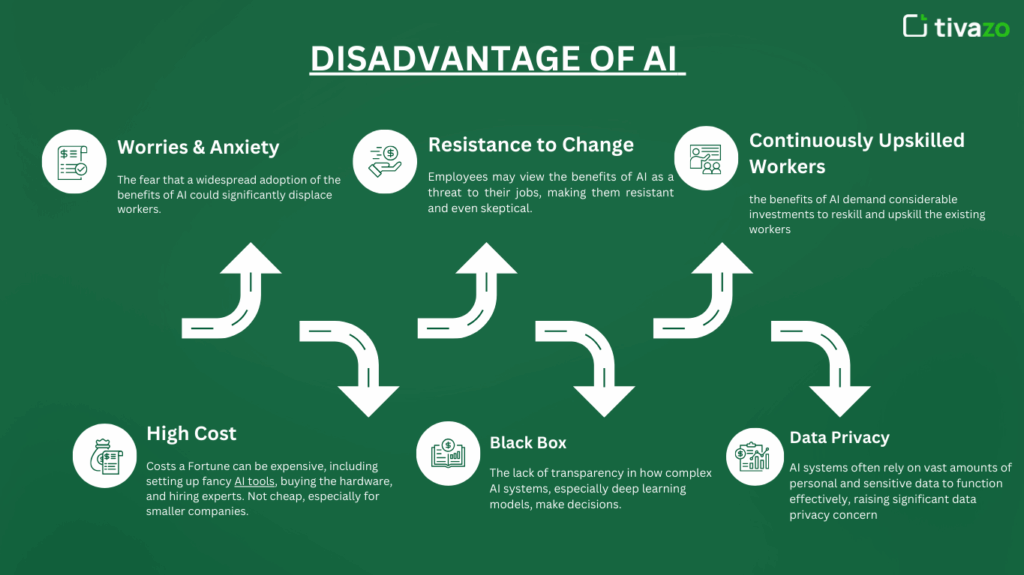
Benefits of AI in the Workplace
Let’s talk about the benefits of AI doing all the thinking, and suddenly, folks can’t even solve basic stuff without asking Siri or shouting at Google. It’s like brain atrophy, but with more smart speakers. And don’t even get me started on the “warmth” factor. Robots are about as cuddly as a cold toaster. Sometimes you just need a real human, not a glorified calculator, y’know? Trust tanks, creativity fizzles, and everyone’s left missing the human spark.
Alright, let’s cut through the corporate fluff and talk real: How do you tell if AI’s pulling its weight at work? Can’t just point at a fancy dashboard and go, “Look, robots!” Gotta have some receipts.
- Productivity. Are folks getting stuff done faster, or is that the benefits of AI just making more noise? If people are zipping through projects or knocking out tedious tasks without losing their minds, boom—you’re onto something.
- Money talk: Are you saving cash? Like, did the AI cut down on overtime, stop people from making those facepalm-level mistakes, or help you squeeze more juice out of your resources? Show me the numbers.
- Revenue’s a biggie. Did sales bump up? Are customers buying more because your AI knows what they want before they do? That’s the good stuff. Predictive analytics, personalization—if it moves the needle, you’ll notice.
- Quality: If complaints drop or stuff stops breaking, thank the bots. Fewer errors mean less time cleaning up messes.
- Customers: don’t leave ‘em hanging. Check those CSAT and NPS scores. Are people happier with support? Are issues getting solved faster? If yes, your AI’s probably not just a glorified paperweight.
- Innovation: Trickier to nail down, but hey, is your team tossing out new ideas? Are you pivoting faster than your competitors? If AI’s helping you see around corners, that’s gold.
Track this stuff. Numbers don’t lie (well, unless you fudge ‘em, but, you know, don’t). If AI’s crushing it, you’ll have proof, and you’ll have a solid reason to double down. The benefits of AI can be endless; however, in the end, it’s up to you how to implement and choose to use your work.
Conclusion
Alright, let’s be real for a second—Benefits of AI at work? It’s kind of a game-changer. We’re talking about saving hours you’d otherwise spend drowning in spreadsheets, making things run smoother, and, honestly, letting people focus on stuff that doesn’t suck the soul out of them. Better decisions, more personalized, whatever—you name it. Of course, it’s not all rainbows. People freak out about losing their jobs, there’s the whole bias mess, and let’s not even get started on how pricey or sketchy the data stuff can get.
But here’s the thing: if you don’t just blindly throw the benefits of AI at every problem, and think about how to make people and machines work together, it’s less “robots are coming for your job” and more like having a supercharged sidekick. Suddenly, you’ve got time to think, create, and do the kind of work that gets you out of bed in the morning. And yeah, your business will run circles around the competition.
Doesn’t matter if you’re hustling in a tiny startup or steering some corporate behemoth, you kinda can’t afford to ignore AI anymore. It’s not just some futuristic buzzword—it’s here, it’s happening, and honestly, if you’re not on board, you’re probably already behind. Welcome to the new normal.
